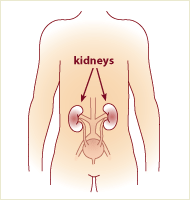Featured Health Support Products
Developed by doctors & herbalist for their patients concerned about:
- Healthy Kidney Filtration & Kidney Function (Maximum Support)*
- Both High Creatinine Levels & High Urinary Protein Levels (Proteinuria)*
Developed doctors and herbalist for their patients concerned about:
- High Creatinine Levels*
- Lowered Kidney Function*
Developed by doctors & herbalist for their patients concerned about:
- High Urinary Protein Levels (Proteinuria)*
- Lowered Kidney Function*
100% Money Back Guarantee!

What Your Kidneys Do
You have two kidneys. They are bean-shaped, and about the size of a fist. They are located in the middle of your back, on the left and right sides of your spine, just below your rib cage. Their main job is to filter extra water and wastes out of your blood and make urine. They also help control blood pressure and make hormones that your body needs to stay healthy.
What is Polycystic Kidney Disease (PKD)?
(Also sometimes called: Autosomal Dominant Polycystic Kidney Disease, Kidneys Cysts, Polycystic Kidney Or ADPKD)
A. Polycystic kidney disease or PKD is a kidney disorder that involves many cysts formed inside the kidneys which can cause the kidneys to become enlarged.*
In Western Medicine what is the Treatment for Polycystic Kidney Disease?
A. According to the National Institute of Health (NIH), the main goal of treatment for individuals with Polycystic Kidney Disease is to focus on controlling symptoms and preventing complications rather than focusing on curing the cause of the problem.*
The NIH states that while high blood pressure may be hard to control, it is believed that figuring out how to control it is the most important part of treatment. Treatment in Western Medicine usually includes blood pressure medicines, low salt diets, diuretics and draining any cysts that are causing any pain, bleeding, blockages or infections. In severe conditions Western Medicine doctors will choose to remove an individual's kidney or both kidneys if too many cysts are present.*
What Causes Polycystic Kidney Disease (PKD)?
A. According to the National Institute of Health (NIH), what exactly triggers or causes the cysts to form in one's kidneys is unknown and the NIH states that Polycystic Kidney Disease is often passed down through families so if a person comes from a family of genes that has this disorder, they may have a 50% chance of developing this disorder.*
What are common Symptoms of Polycystic Kidney Disease?
A. Common symptoms of Polycystic Kidney Disease can include abdominal pain, drowsiness, joint pain, blood in the urine, excessive urination at night, enlarged liver, high blood pressure or flank pain. Also, as many as half of people with Polycystic Kidney Disease have cysts on the liver.*
How are Kidney Cysts identified for those with Polycystic Kidney Disease?
A. Polycystic kidney disease and cysts on the kidneys or liver are often identified through tests such as Abdominal CT scans, Abdominal Ultrasounds, Abdominal MRI Scans, or Intravenous Pyelograms.*
What is the Prognosis or Expectation with an individual who has this condition?
A. According to the NIH, Polycystic Kidney Disease gets worse slowly and eventually can lead to end stage kidney failure, kidney transplant and can lead to liver disease. This is why prevention is so important.*
References: http://www.ncbi.nlm.nih.gov
Click Here to Read About Dietary Kidney Health Support *
[Top]

 Get Well Natural, LLC
Get Well Natural, LLC  Kidney Function & Regeneration Health
Kidney Function & Regeneration Health  Platelet & Blood Cell Health
Platelet & Blood Cell Health  Prostate, Flow & Function Health
Prostate, Flow & Function Health  General Mind & Body Health
General Mind & Body Health  Heart, Cholesterol & Cardio Health
Heart, Cholesterol & Cardio Health  Allergy-Free Body
Allergy-Free Body  Anxiety & Stress
Anxiety & Stress  Blood Platelet Counts & Function
Blood Platelet Counts & Function  Blood Pressure Health
Blood Pressure Health  Kidney Health
Kidney Health  Immune System Health & Balance
Immune System Health & Balance  Prostate & Urinary Health Function
Prostate & Urinary Health Function  Blood Sugar Balance
Blood Sugar Balance  Cardiovascular Heart Health
Cardiovascular Heart Health  Detoxification & Healthy Cells
Detoxification & Healthy Cells  Women's Health
Women's Health  Liver Regeneration
Liver Regeneration  Pain-Free Body
Pain-Free Body  Water & Air Filtration
Water & Air Filtration 


